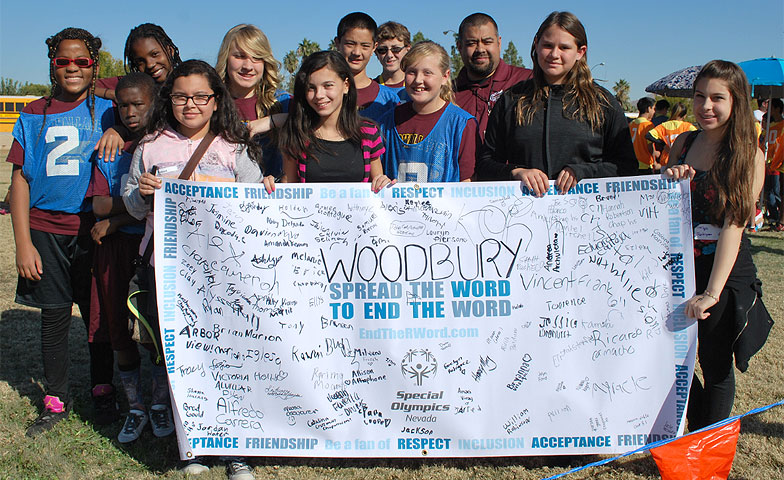National Spread the Word to End the Word Day is March 7, 2018
For middle school students, each day is stacked with challenges—from dealing with physical and emotional development to navigating friendships and social situations, all while transitioning from elementary school in preparation for transition to high school. For students with intellectual disabilities, the challenges are even greater, as these students are often bullied and disengaged from school-based sports, clubs, or social and extracurricular opportunities.
The turbulence that characterizes this stage of life for young people can be abated with intentionality of programming that creates a safe, welcoming, and supportive learning environment. The Special Olympics Unified Champion Schools program, with a focus on social inclusion through sport, leadership, and whole school activities, speaks directly to the needs of middle school students, advancing social emotional learning and reducing bullying and offensive language, resulting in improved behavior, educational outcomes, and school climate (Center for Social Development and Education (CSDE), University of Massachusetts Boston, 2017).
One of the most powerful tools for reaching the greatest number of students with poignant messages of inclusion and respect is the Spread the Word to End the Word campaign. At a critical time when adolescents are forming attitudes, the Spread the Word or R-word campaign calls attention to the hurtful effects of the R-word (retard/retarded). In its 2013 Unified Champion Schools report, the Center for Social Development and Education found that students who participated in an R-word campaign were more likely to take action toward others when hearing the R-word, 58%, compared to 29% of nonparticipating students (CSDE, 2013, p. 41). The campaign isn’t just about the R-word though; it’s about changing attitudes of exclusion and derision to attitudes of acceptance and respect.
Campaign activities can vary by school, but typically coincide with the annual Spread the Word to End the Word Day, the first Wednesday in March. Last year in Wisconsin, students at Holmen Middle School hung a banner in the school cafeteria in conjunction with the national day of awareness and asked students to sign it in a pledge to end use of the R-word. It was the culmination of several weeks of disability awareness lessons in the classroom. Students at Viroqua Middle School organized a pledge drive, wore campaign T-shirts, and led a pep assembly emphasizing respect and diversity. Spearfish Middle School in South Dakota held a pep rally featuring speakers including a Special Olympics athlete, and filled the gym with beach balls to be spiked down in a symbolic defeat of divisive language such as the R-word.
If you let students run with their ideas, the possibilities for implementing a meaningful campaign in your school are endless. The following suggestions can help:
- Meet with the principal to discuss the campaign and obtain support.
- Work with students in a club, class, or other school group to organize awareness activities concerning harmful effects of the R-word.
- Campaign activity examples:
- Hold a rally or assembly. Have students give speeches about the R-word, and allow students to hear the perspectives of their peers with disabilities.
- Hold a pledge drive encouraging youth and adults to sign a banner or take an online pledge to stop using the R-word.
- Sell messaging T-shirts calling for respect and discontinued use of the R-word (http://www.r-word.org/r-word-resources.aspx).
- Incorporate the topic into classroom discussions.
- Make discontinued use of the R-word part of your school’s behavior expectations.
- Share information about the campaign via social media or the school’s website. Have students write a blog, develop a podcast or campaign video, or include information in morning announcements.
- Create a compelling campaign theme.
- Develop a plan.
- Contact your State Special Olympics office for campaign promotional items such as R-word stickers, posters, or banners.
- Track the number of pledges, people involved, and highlights. Talk with administration about sharing this information with your board of education or local newspaper.
If your school has never participated in a Spread the Word campaign, start small; additional activities can be added in the future. For many students, the campaign begins a conversation and opens the door for further involvement in other inclusive activities that make a difference in their lives and in the life and culture of our schools. For more information, visit www.r-word.org.
References
Center for Social Development and Education. (2013). Special Olympics Project Unify final evaluation report (2012-2013). Boston, MA: Author. Retrieved from https://www.umb.edu/editor_uploads/images
/centers_institutes/center_social_development_education
/ProjectUNIFYYear5FinalReport_11.26.pdf
Center for Social Development and Education. (2017). The Special Olympics Unified Champion Schools program: Year 9 evaluation report (2016-2017). Boston, MA: Author. Retrieved from https://www.umb.edu/editor_uploads/images/
Year_9_Evaluation_Report_Final_Submitted_12.14.17.pdf
